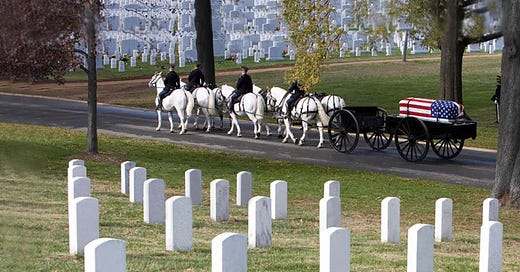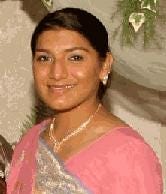Being an immigrant, I don’t personally know anyone who fought in any of the nation’s wars. But that does not mean that to me Memorial Day is no more than the day that signifies the beginning of summer.
Back in the early 2000s, I had a neighbor who had immigrated as an adult from Italy during the 1960s. The US was engaged in the Iraq and Afghanistan wars at the time. “This country likes war. It has been in some or other conflict every decade,” he said shaking his head. His remark made an impression on me and upon reflection, I realized that he was right. This was a kind of milestone moment (that is why I am remembering it over two decades later) for me as it was part of my gradual awakening to the reality of American empire.
A decade earlier, when the US was engaged in the first Iraq war, I had been more trusting. The local newspaper had published a call for cards to be mailed to soldiers in Iraq/Kuwait. I was not yet a naturalized citizen, but I nevertheless felt committed to this country. And so, I wrote a few postcards and dropped them off at the designated location. To the extent that I can recall, I was responding to the soldiers’ separation from home and family and to their being in dangerous situations. Since the homeland did not feel threatened, there wasn’t the kind of feeling that one might have when engaged in an existential conflict.
Two films come to mind that are specifically about soldiers who died in combat. Taking Chance and Section 60. Another recent movie about returning soldiers that made an impression on me is The Lucky Ones. These movies are different from many of the more celebrated war movies because they are not violent or gritty. They focus on the aftermath of all that. In my view, they are just as powerful and insightful. I related to them on an emotional level.
One of the soldiers profiled in Section 60 is the son of a Pakistani-American family. The young man’s father later spoke at the Democratic National Convention and published a memoir. Seeing the parents’ stoic grace and hearing /reading the father’s words was a humbling experience. The title of the memoir, “An American Family: A Memoir of Hope and Sacrifice,” is very apt.
I am glad that we have a day set aside to remember and honor those who fight in the nation’s wars. I just wish that we had way fewer wars, that the wars we do get involved in were more necessary, and that we were prosecuting those wars in a more just and moral manner.
~~~
Daughter, Soldier, Medic
I wrote this profile in 2005.
What would you say if your seventeen-year-old daughter came to you one day and said that she had decided to join the army? What if you had been in the United States only ten years and were still trying to get the hang of it all?
This is exactly what happened to Chuni-bhai and Prafulla-ben Ladani back in 1997. At the time, not only did their daughter Alpa come up with this unconventional career choice, she made it clear that she was not going to take “No” for an answer. “If you don’t give me permission now, I will wait until I am eighteen and then I will join. You won’t be able to do anything about it then” she told them.
As the Ladanis tell it, their reservations were not only because Alpa was making an unusual career choice and that too at a relatively young age. The idea of a woman putting herself in harm’s way was a concern as well. On top of that, there was the issue of social stigma. In a society where the medical and engineering professions are much sought after and respected, their daughter was about to choose a path that would make getting even an undergraduate degree an arduous process.
But, love does conquer all. With open hearts, the Ladanis gave Alpa permission to join the Army. If she was so determined, better to get started sooner rather than later, they figured. What is remarkable is that they did not stop there. Chuni-bhai sought input from his friends and colleagues on the best options to pursue within the army. And so, it was that Alpa trained as a medic, and worked with a unit providing services relating to dentistry, X-ray, optometry and immunizations.
It was November 2003 when the order came informing them that Alpa was being deployed to Iraq. This was not the first time that she would be going away. She had been part of the security detail at the 2002 Winter Olympics in Salt Lake City. And she had spent three weeks in Nicaragua as a medic assisting an engineering unit. But this assignment would be in a different league altogether.
“How did you feel when you found out?” I asked Prafulla-ben. “We were fine”, she said in her unassuming way. “We did not want to let Alpa feel guilty, or weak or afraid. We did not want her looking back with doubt. And so we said goodbye to her with smiles on our faces and prayers in our hearts.”
It is now fifteen months later and Alpa is back in the States after completing her tour of duty in Iraq. In the course of my conversation with her, I learnt a lot about contemporary army life and especially about the war in Iraq.
For starters, Alpa faced no hardship as a vegetarian because the army provided non-meat options at all times. As it turned out most of the cafeteria staff on her base in Iraq were from India. They took her under their wing and on occasion even cooked Indian dishes just for her. Although Alpa is fluent in Gujarati and knew a smattering of Hindi, she credits her Iraq sojourn with strengthening her mastery of Hindi.
Some of her fellow soldiers were curious about her religion. With questions about that out of the way, they readily accepted her as one of their own.
Alpa was happy to report that the Army did a fine job of taking care of the soldiers. Alpa was able to call home each week and her family was able to send her “care packages” (of her favorite farsan, among other things) on a fairly regular basis. The base had an Olympic sized swimming pool, volleyball courts, DVDs of the latest movies released here at home, and even a store selling everything from CDs to jewelry.
Which is not to say that the Iraq sojourn was a picnic, by any means.
“One of the hardest things”, Alpa told me animatedly, “was not knowing when a bomb might land in our midst. It is one thing to die in battle, and quite another to die while walking from the barracks to the mess hall.”
I asked her the frequency of these mortar attacks. “At least once a day or several times a day” she said. “In fact, towards the end of my stay it became so bad that I would find myself obsessing about which of two alternate routes I should take while going about my work on the base. My brain would try to ‘game’ the odds, and somehow try to come up with some logic to try to predict the ‘safer’ route.”
When she talked of the death and destruction that she saw in Iraq, her eyes brimmed with tears. “No one should have to see and experience what I have experienced.” She stated flatly. “A nineteen-year-old Marine died in my arms. I have gone to the scene minutes after a mortar attack and have come up close and personal with the blood and gore, with body parts strewn about.”
She says she has seen real hardship, beyond her own. The Indian, Philippine and other support staff hired by the subcontractors don’t get nearly the same amenities as the American soldiers do. She cannot get over how hard they work, and for how little in return.
Alpa admits that all these experiences have had a profound effect on her. “I have become able to adapt and I have become open-minded,” she says. “It is hard to be patient with whiners.”
In another year Alpa will graduate from college — a few years later than her peers. But, with no debts and with a maturity and tenacity well beyond her years. “I don’t know if I will stay with the Army,” she admits. “I want to settle down, get married, start a family” she says with a smile.
During our interview, Prafulla-ben sat in on our conversation. “When I see the news reports on television, I feel sorry for everybody. Even the Iraqis who die have mothers, and those mothers cry just like any other mother.” Prafulla-ben is in exalted company indeed. In the first Mothers Day proclamation back in 1870, Juila Ward Howe wrote
…… We women of one country will be too tender of those of another country to allow our sons to be trained to injure theirs….
Almost 150 years later, war is unfortunately still with us. The big differences are that the above sentiment now applies to daughters as much as it does to sons, and fathers as well as mothers feel the anguish when their children go to war.
I felt both humbled and honored to have connected with this extraordinary family and this extraordinary young woman.
~~~
In honor of the soldiers and their families, I plan on watching at least one of the movies I mentioned above.
Photo credit: A scene from “Section 60.”






Nandini- Thank you so much for sharing this story. It’s a great reminder of what’s really important. 🙏
I'm an immigrant too (from Canada), so on Memorial Day, I remember the sacrifice of soldiers worldwide:
https://theconversation.com/why-remembrance-of-indian-soldiers-who-fought-for-the-british-in-world-war-ii-is-so-political-86885
Words of Canadian politician Tommy Douglas, before declaring war in 1939:
"If you accept the completely absolutist position of the pacifist, then you are saying that you are prepared to allow someone else who has no such scruples to destroy all the values you've built up. This is what I used to argue with Mr. Woodsworth ... if you came to a choice between losing freedom of speech, religion, association, thought, and all the things that make life worth living, and resorting to force, you'd used force. What you have internationally is what you have within a nation. You must have law and order, and you must have the necessary military means to enforce that law and order."
https://en.wikipedia.org/wiki/Tommy_Douglas
Personally, I protested the war in Iraq, and don't think the US should have been involved there, but sometimes, war is unavoidable.
In any case, thank you for posting this story. I look forward to learning more about Alpa Ladani.